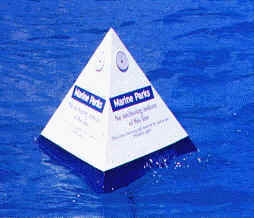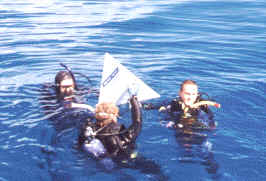|
It is no secret that anchors,
chain and coral reefs do not mix well. The reefs always
lose. The purpose of the Reef Protection Marker Buoy Program
is to reduce anchor damage in a cost effective manner. |
 |
| This Reef Protection Marker
Buoy Program has been one of OUCH's most successful and important
endeavors. This project is as simple as it is effective,
involving 4 distinct steps.
1. Select the site. The term "sensitive site" is used here
to denote locations of medium to high conservation value, which are
currently under significant anchoring pressure (commercial and
recreational) or have exhibited marked deterioration in reef
condition. Reef managers, commercial operators and the public
all have input into the site selection
process. |
| 2. Reef survey. The
entire sensitive site must be surveyed (above and below water) to
determine the extent of damage and to map the edge of the reef for
future marking. |
| 3. Installation of marker
buoys. The pyramid-shaped buoys are installed in the seafloor
with a drilled/cemented pin. The buoys delineated the edge of
the reef and anchoring in not permitted on the landward side of the
buoys. |
| 4. Maintenance. Due to
the wear and tear of the ocean and the occasional public abuse, this
part of the project is forever ongoing. The buoys are
inspected and cleaned quarterly. The tackle and buoys are
replaced annually, and recycled when
possible. |
 |
| To date, OUCH has surveyed
and marked 10 fringing reefs in the Whitsunday region. The
project has proven quite successful with an estimated 80% reduction
in anchor damage. The marker buoys are now being used
throughout the Great Barrier Reef marine park.
It is important to note that moorings, which eliminate the need
to drop an anchor, are still recognised as the best tool to prevent
anchor damage in the marine environment. However, moorings are
both expensive to install and maintain as well as carry a liability
responsibility. The marker buoys are seen as a cost-effective
alternative that can be used in conjunction with a mooring system. |